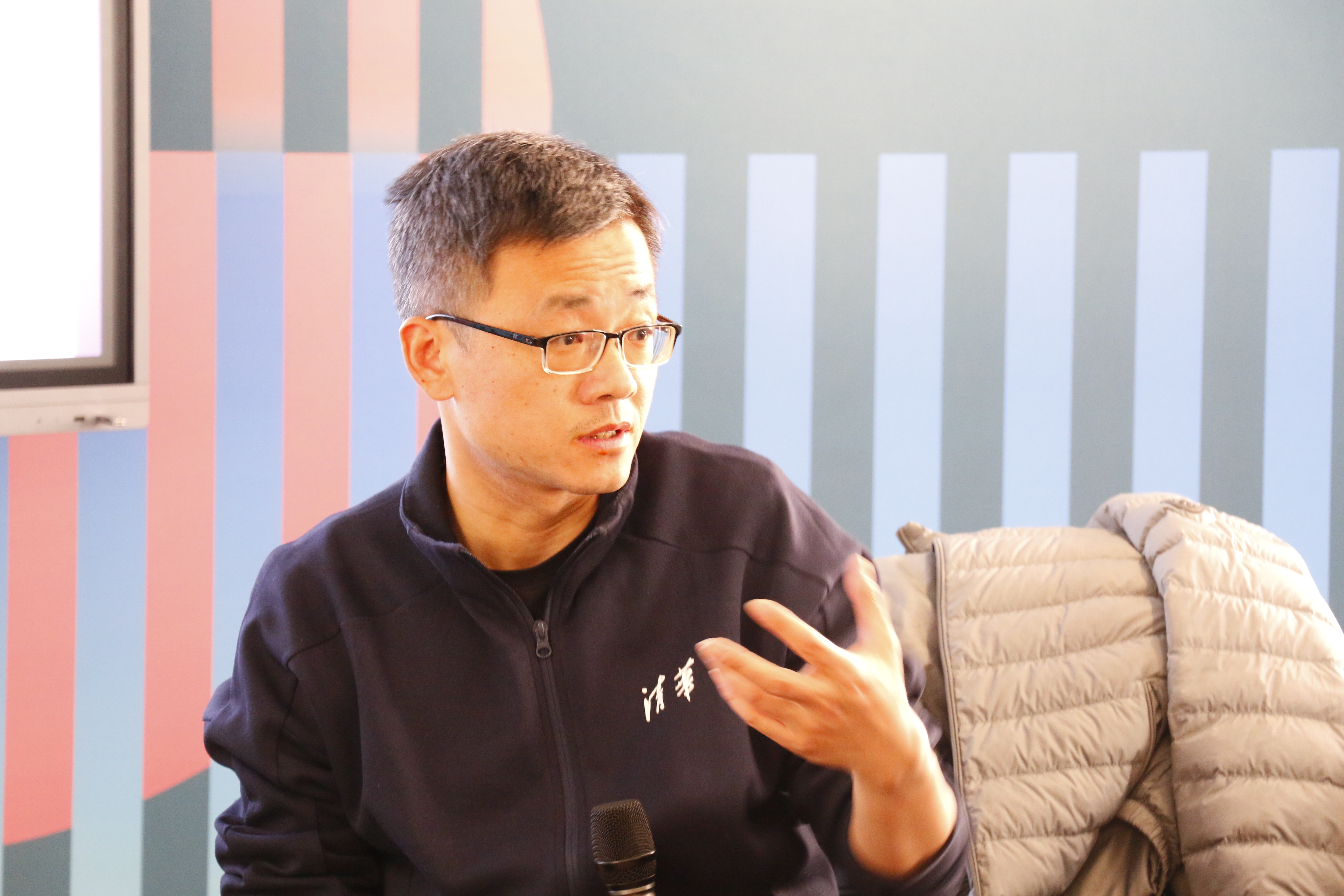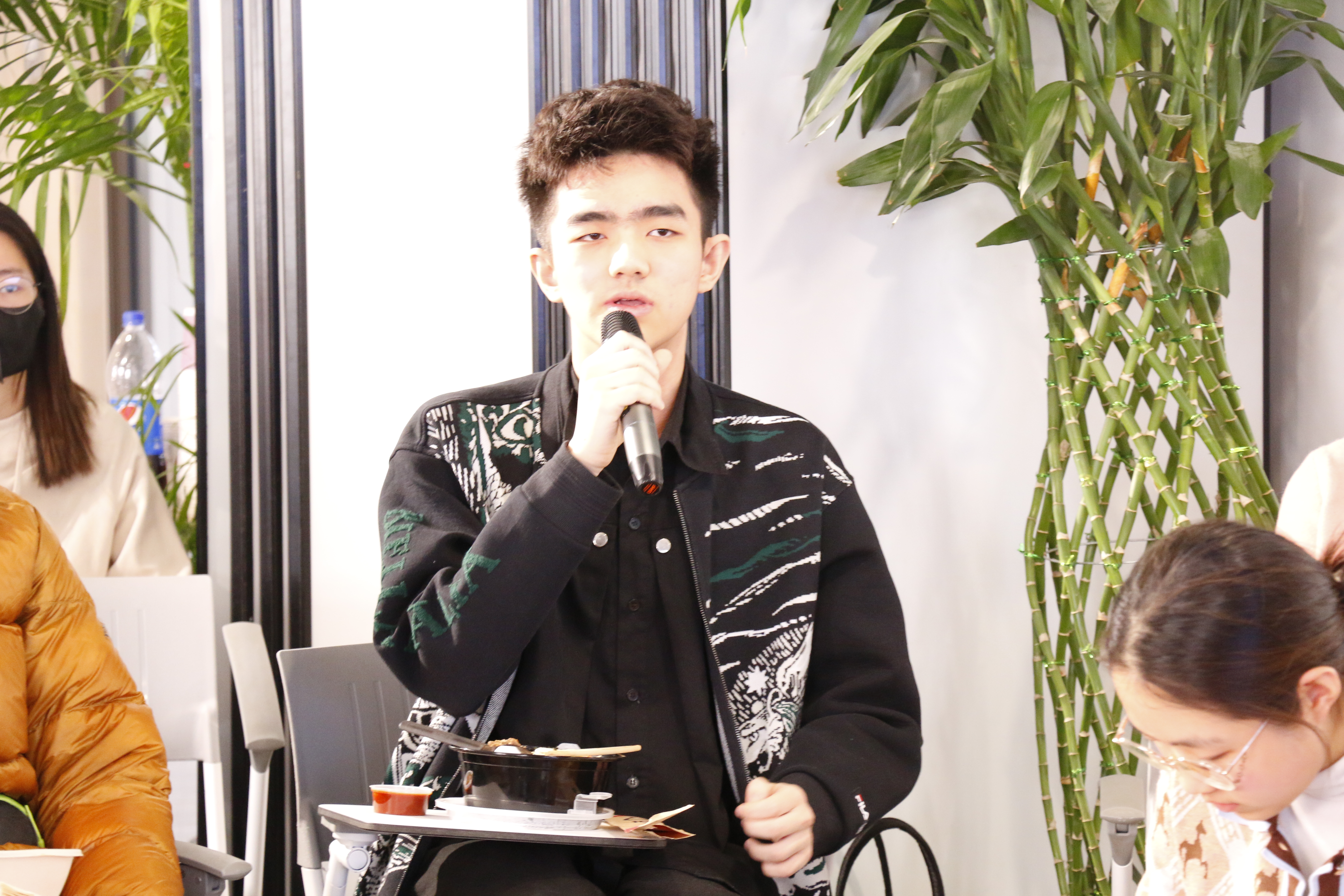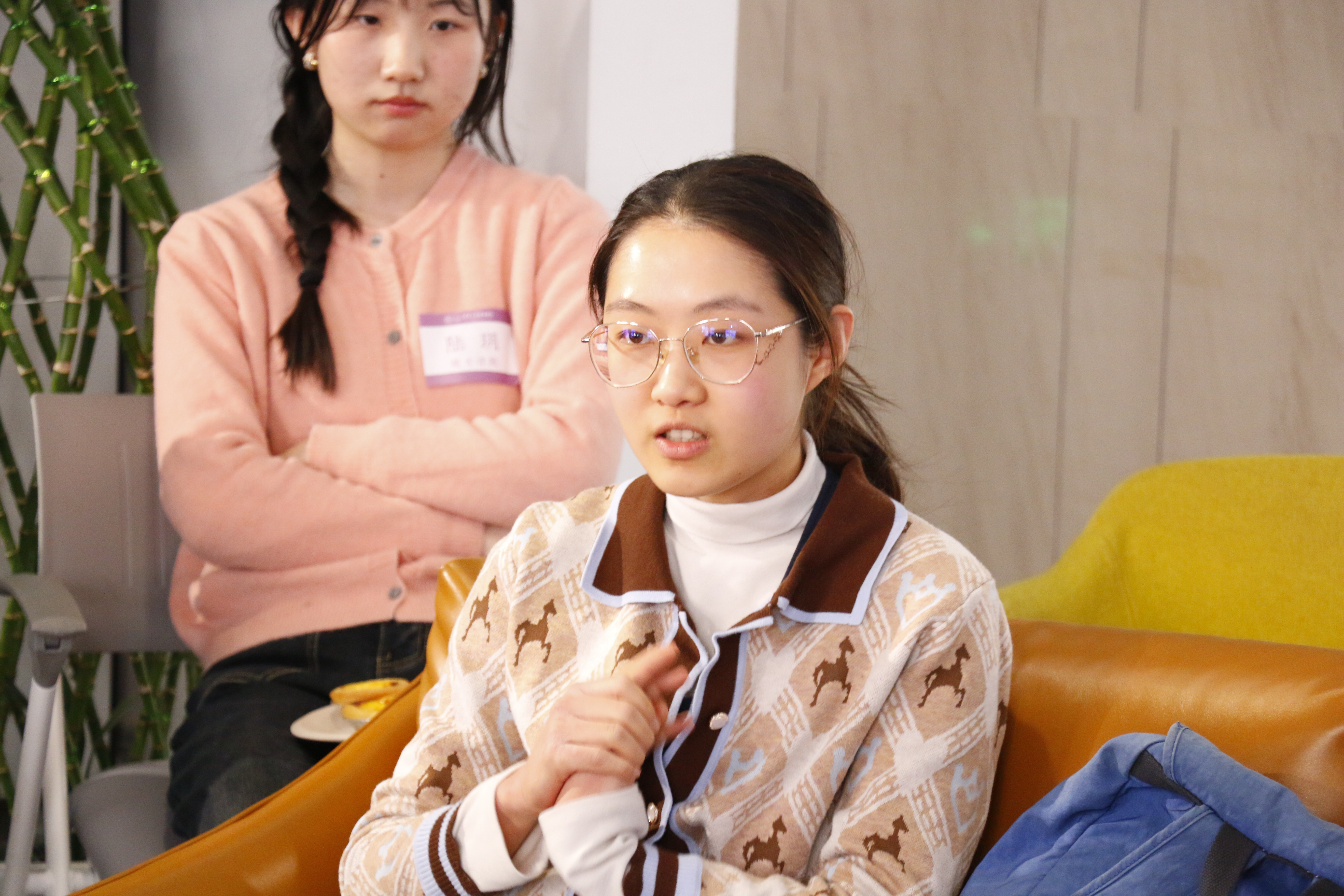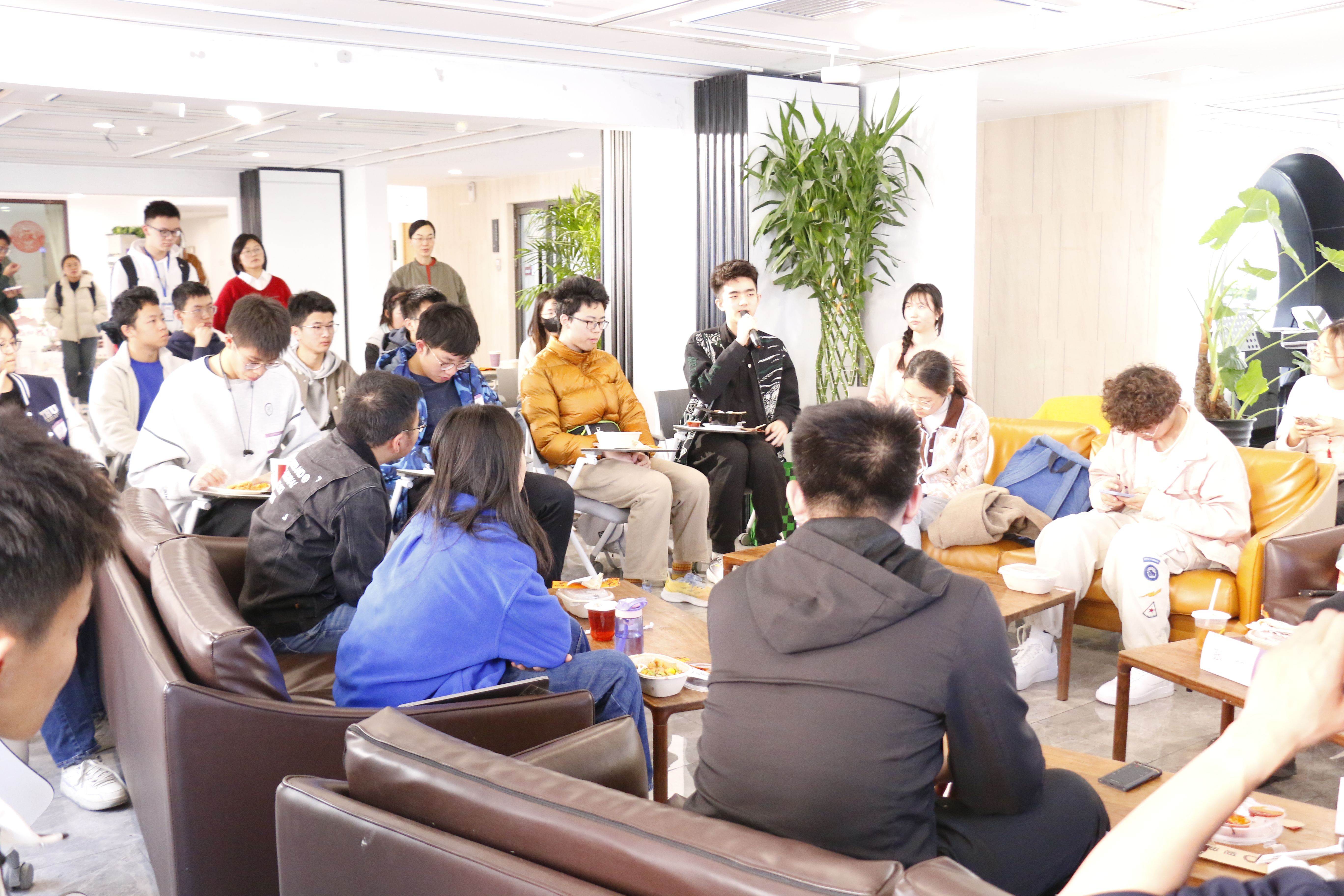How will AI-empowered education expand the boundaries of teaching and influence the learning paradigms? At noon on March 22, more than 20 teachers and students from different majors inside and outside the university discussed this question on the first floor of the North Building of Building 10. At the beginning of the talk, Dean of Xinya College Mei Ciqi encouraged students to analyze AI based on their own explorations. Teachers and students, working together as learners, listed our attempts at AI before discussing whether AI can really empower our learning. Students from different majors and schools sat opposite each other, looking into the relationship between AI and students, learning, and academics from an interdisciplinary perspective.

Mei Ciqi
Zhou Zichao, a student majoring in Philosophy, Politics, and Economics (PPE) at Xinya College, first came into contact with AI when he was sorting out literature for his graduation thesis. He asked teachers and students present: Should students use large-scale models when doing assignments? To what extent should we use such models? Liu Junqiang, a teacher from the School of Social Sciences, believed that we should pay careful attention to the ways and means of using AI in learning. Mei Ciqi said that students are allowed to use AI in his class, but they have to compare, evaluate, and judge the results generated by different AI tools. Mei reminded everyone of the potential dangers in the use of AI: "Convergence", the essence of AI, implies the possibility of omissions. However, scientific research requires chance encounters, and breakthroughs and innovation may come from seemingly irrelevant sources.
Deng Jie, a student majoring in Creative Design and Intelligent Engineering (CDIE) at Xinya College, is currently focusing on creative computing based on large-scale language models. However, unlike Zhou Zichao's experience of using AI in literature reviews, Deng Jie has experienced the process of finding and reading papers through AI before finally reading literature by herself: "Through this process, I find myself 'stronger' than AI." Based on her experience in manuscript reviewing, Deng Jie proposed that AI has its limitations in this aspect, but it is also expected to increase fairness and reduce the possibility of bias. Similarly, Cai Yikai from Chucai Honors College of Hubei University ran into a serious flaw when applying AI in academic research—AI failed to remind him that the methodology he chose had become obsolete in economics. Liu Junqiang said that this problem stems from the fact that AI is currently an "average" tool that is unable to capture the latest academic progress. Li Changhong, a law major, said he completed excellent assignments using AI: Within the framework he built, AI can provide lots of ideas to help improve research plans. However, in the highly specialized field of law, Li Changhong said that AI is completely useless and cannot complete literature reading and case analysis for him.
Jing Yi, a student from the Department of Computer Science and Technology, said that he highly trusts AI in programming. AI code generation greatly improves his work efficiency. Especially when exploring unfamiliar domains or reading foreign language materials, he can use AI to complete translation and generate mind maps, helping him break down the barriers of disciplines and languages. Different from Jing Yi's positive experience, Liu Yueran from the same department believed that AI programming has its vulnerabilities: The code generated by AI may not necessarily be understood by the programmer. Reliance on the instrumental use of AI may focus more attention on whether outcomes work and less on the importance of insight into the internal logic. However, Yan Chengyu from the Department of Foreign Languages and Literatures argued that the binary division between the "result" and the "process" is potentially unreasonable: Since it is still human training that determines the result given by AI, "result orientation" should not be a reason for us to reject AI. Especially when AI is still in its infancy, we should leave room for technological development and public attitude change.

Jing Yi
Ruan Mingzhuo from the Department of History of Rixin College emphasized the difference between "reading" and "writing" in using AI: Reading is for understanding existing frameworks, while writing is the process of shaping new frameworks. AI may facilitate the process of reading, but frameworks can only be created by humans. However, Jing Yi believed that AI's ability to understand language goes hand in hand with its generative skills: "We can take AI as a function; when we learn a function, we simultaneously learn its inverse function." At the same time, Ruan Mingzhuo mentioned that the qualitative change in the relationship between teachers and students brought about by the current use of AI assistants needs further consideration. Li Jiaqi, a computer science major, said that she hopes to put AI back into the position of an "assistant" rather than elevating it to the position of a "teacher". The value of AI lies in knowledge retelling, and social relationships such as peer support are far beyond what AI can provide.
Therefore, Mei Ciqi asked the following questions: Will there be any differences in the use of AI across different disciplines? "Completeness" emphasized in humanities and social sciences and "self-consistency" emphasized in science and engineering are often incompatible in practice. What is the foothold of AI-empowered learning? In this regard, Lu Yue from Chucai Honors College of Hubei University said that her major strongly advocates the use of AI as a creative auxiliary tool, but it is important for creators to maintain dominance over their works. Tang Shiyun from the Academy of Arts & Design has a more complicated attitude towards the integration of AI and art. In her learning experience, AI has become part of the disciplinary setting, which requires a consequent change in creative thinking: The forced introduction of AI shifts the focus of artistic creativity to production prompts—generating dense, similar, and cohesive image sets by selecting keywords. This not only means homogeneous training for creators but also causes visual pollution in an environment of excessive commercialization. Jing Yi is open-minded and positive about the creative prospect of AI. He believes that AI's learning ability allows more untrained people to participate in creation. Handing out brushes to more people, it demonstrates the potential of liberating productivity and helping overcome professional barriers. Similar to Jing Yi's point of view, Ma Wenlong believed that people and AI can get out of the trap of controlling and being controlled. Engaging with AI is like having a conversation, and it does not necessarily imply a change of values or submission from either side. Ma Wenlong even suggested that "learning with AI" should be made a compulsory course for every Tsinghua student, so as to dispel the cowardice brought about by "looking far away" and "fantasizing", and discover the true value of AI. Zhao Guangye, a student enrolled in Xinya College in 2023, said that experience and experiment are necessary for us to get closer to AI.

Tang Shiyun
AI brings about a revolution in individual work efficiency and the deprivation of subject growth; it facilitates the liberation of knowledge and productivity but regulates aesthetics and creativity. The proposition concerning AI always seems to be governed by the two-way "dialectics". As Zhang Yi, a teacher from the Center for Teaching Quality Evaluation, said, Tsinghua University is still exploring how to empower teaching with AI. The relationship between humans and technology, as an enduring theme, will never have a definitive conclusion. Today, we discussed how we should coexist with AI from an interdisciplinary perspective based on multi-dimensional thinking, which provided positive disenchantment and invaluable inspiration for each participant.
